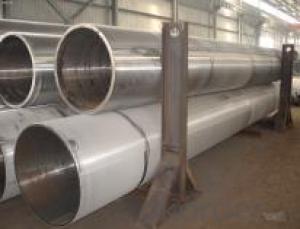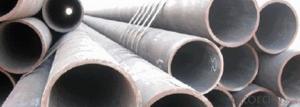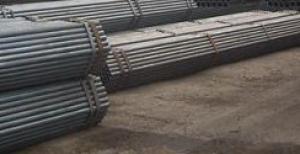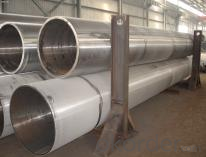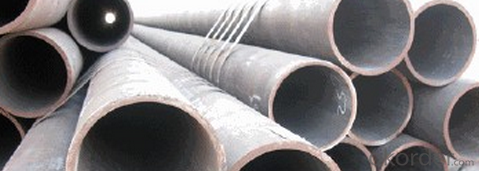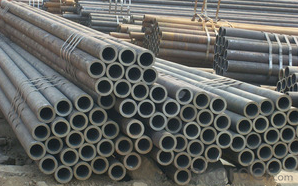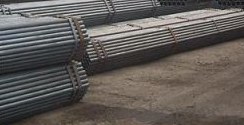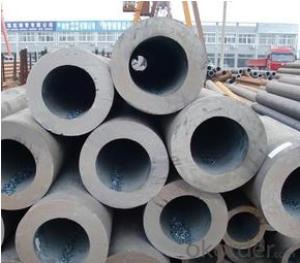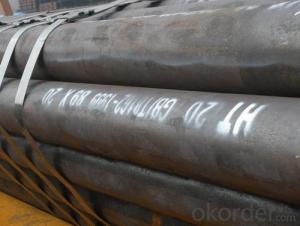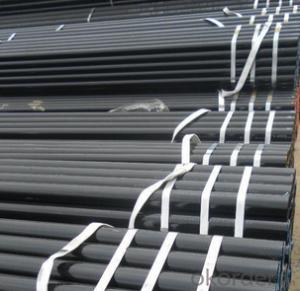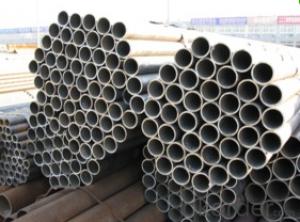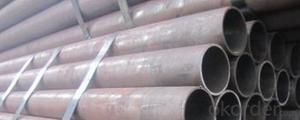Schedule 40 Seamless Carbon Steel Pipe API J55 CNBM
- Loading Port:
- Qingdao
- Payment Terms:
- TT OR LC
- Min Order Qty:
- 10 pc
- Supply Capability:
- 30 pc/month
OKorder Service Pledge
OKorder Financial Service
You Might Also Like
Quick Details
| Thickness: | 1.73 - 59.54 mm | Section Shape: | Round | Outer Diameter: | 10.3 - 914.4 mm |
| Secondary Or Not: | Non-secondary | Application: | Fluid Pipe | ||
| Technique: | Hot Rolled | Certification: | API | Surface Treatment: | Galvanized,vanish covering, black painting, galvenized ect. |
| Special Pipe: | API Pipe | Alloy Or Not: | Non-alloy | Length: | 5-12m as per customer's requirements |
| SCH: | SCH10~160, STD, XS & XXS | Payment Terms: | L/C T/T | Supply Ability: | 5000 Ton/Tons per Week |
| Product: | pipe prices | Grade: | 10#,20#,45#,A106(B,C),A53(A,B),12Cr1MoV,12Cr1MoVG,12Cr2Mo,13CrMo44,13CrMo45,15CrMo,15CrMoG,St52,St52.4,10#-45#,A53-A369,Cr-Mo alloy,ST35-ST52 | Standard: | API 5CT,API 5L,ASTM A106-2006,ASTM A53-2007,DIN 17175,GB 3087-1999,GB 5130,GB 6479-2000,GB 9948-2006,GB/T 17396-1998,GB/T 5312-1999,GB/T 8162-1999,GB/T 8163-1999,API,ASTM,DIN,GB |
Packaging & Delivery
| Packaging Detail: | By bundles, seaworthy wooden cases, steel framed cases, and simple packaging or according to the demand of the customers. |
| Delivery Detail: | within 5-15 days |
Specifications
1.pipe prices
2.Supply Ability:5000 Tons per Week
3.Payment Terms:L/C T/T
High quality Carbon steel pipe, Best pipe prices
1) Application: Overheat pipe for low and mediumpressure boiler,boiling water pipe, locomotive smoke pipe(big and small),Carry gas ,water or oil in the industries of petroleum and natural gas etc
2) Materials: 10#, 20#, 45#, 15CrMo, 12Cr1MoV, 13CrMo44, 12Cr2Mo, 13CrMo45, 12Cr1MoVG, 15CrMoG, API J55, API K55, API N80, API L80, API P110
3)Pipe according to standard: GB 3087-1999, GB/T 8163-1999, GB/T 8162-1999, GB 9948-2006, GB/T 17396-1998, GB/T 5312-1999, GB 6479-2000, GB 5130, DIN 17175, API 5CT, API 5L .
4)Packing: By bundles, seaworthy wooden cases, steel framed cases, and simple packaging or according to the demand of the customers.
Technical Parameters of Seamless Steel Pipe
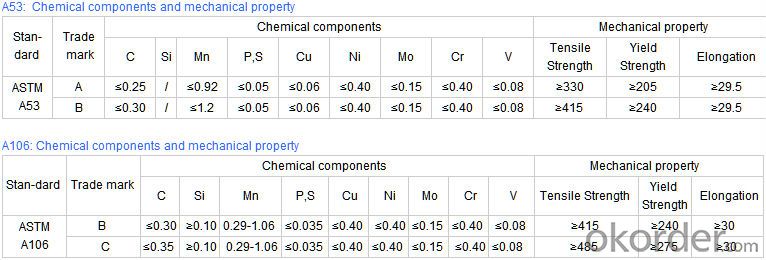
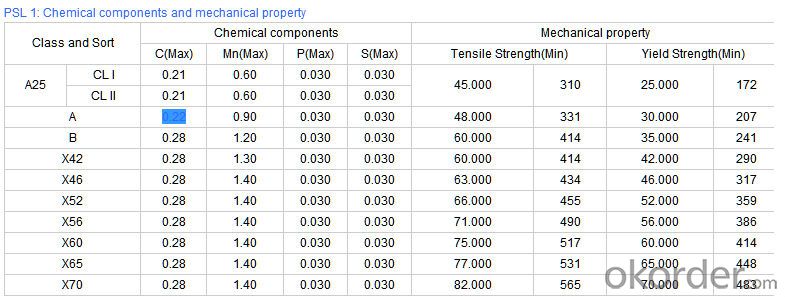
- Q: Can steel pipes be used for brewery installations?
- Indeed, brewery installations can utilize steel pipes. Within breweries, steel pipes are frequently employed for a multitude of purposes, including fluid transfer, equipment interconnection, and plumbing system establishment. Steel pipes boast exceptional durability, strength, and resistance to corrosion, rendering them apt for handling the challenging conditions and high-pressure environments typically encountered in brewery installations. Moreover, the ability to weld steel pipes together enables seamless connections, guaranteeing a dependable and leakage-free operation. Nevertheless, it remains crucial to ensure that the steel pipes employed in brewery installations comply with the requisite standards and regulations, thereby safeguarding the safety and quality of the beer production process.
- Q: What are the different types of steel pipe coatings for nuclear power plants?
- There are several types of steel pipe coatings used in nuclear power plants, including epoxy coatings, polyethylene coatings, fusion bonded epoxy coatings, and coal tar enamel coatings. These coatings are applied to steel pipes to provide protection against corrosion, enhance durability, and maintain the integrity of the pipes in the demanding environment of nuclear power plants.
- Q: How are steel pipes used in the construction of offshore platforms?
- Steel pipes are used in the construction of offshore platforms primarily for their strength and durability. These pipes serve various purposes such as transporting fluids, providing structural support, and enabling the installation of essential equipment. They are commonly used for the fabrication of underwater pipelines, risers, and conductor casings, ensuring efficient and reliable operations in harsh marine environments.
- Q: Can steel pipes be used for underground gas distribution?
- Yes, steel pipes can be used for underground gas distribution. Steel pipes are commonly used for gas distribution as they are strong, durable, and can withstand high pressure. Additionally, steel pipes have excellent resistance to corrosion, which is crucial for underground installations. However, it is important to ensure proper coating and insulation to prevent any potential damage or leakage.
- Q: What are the different types of steel pipes available?
- There are various types of steel pipes available in the market, each designed to meet specific requirements in different applications. Some of the commonly used types of steel pipes include: 1. Carbon Steel Pipes: These are the most common type of steel pipes and are primarily made of carbon. They are used in a wide range of applications, including transportation of fluids and gases, structural applications, and plumbing. 2. Stainless Steel Pipes: These pipes are made of an alloy that contains a high percentage of chromium, which provides excellent corrosion resistance. Stainless steel pipes are widely used in industries such as oil and gas, chemical processing, and food processing. 3. Alloy Steel Pipes: As the name suggests, these pipes are made of an alloy that contains a combination of different elements, such as chromium, molybdenum, and nickel. Alloy steel pipes offer enhanced strength, durability, and resistance to high temperatures, making them suitable for applications in power plants, refineries, and petrochemical industries. 4. Galvanized Steel Pipes: These pipes are coated with a layer of zinc to protect them from corrosion. Galvanized steel pipes are commonly used in plumbing systems, water supply lines, and outdoor structures due to their excellent resistance to rust and long-lasting durability. 5. Seamless Steel Pipes: These pipes are manufactured without any welding seam and are often preferred for applications that require high pressure, high temperature, or a smooth inner surface. Seamless steel pipes are commonly used in industries such as oil and gas, automotive, and aerospace. 6. Welded Steel Pipes: These pipes are manufactured by welding two pieces of steel together. They are available in various shapes and sizes and are commonly used in construction, water supply systems, and general engineering applications. 7. ERW (Electric Resistance Welded) Steel Pipes: These pipes are manufactured by passing a high-frequency electric current through the steel strip and then welding the edges together. ERW steel pipes are widely used in oil and gas transportation, structural applications, and fencing. 8. LSAW (Longitudinal Submerged Arc Welded) Steel Pipes: These pipes are made by bending and welding a steel plate into a cylindrical shape. LSAW steel pipes are commonly used in large-scale infrastructure projects, such as oil and gas pipelines and bridge construction. In summary, the different types of steel pipes available include carbon steel pipes, stainless steel pipes, alloy steel pipes, galvanized steel pipes, seamless steel pipes, welded steel pipes, ERW steel pipes, and LSAW steel pipes. The choice of steel pipe type depends on the specific requirements of the application, including factors such as corrosion resistance, strength, temperature, and pressure resistance.
- Q: How are steel pipes inspected for defects?
- Steel pipes are typically inspected for defects using various non-destructive testing methods such as ultrasonic testing, magnetic particle inspection, and visual inspection. These techniques help identify any cracks, corrosion, or other defects in the pipes, ensuring their structural integrity and quality.
- Q: Which is better, galvanized steel pipe or stainless steel?
- Most of the use requirements are to maintain the original appearance of the building for a long time. In determining the type of stainless steel to be chosen, the main consideration is the aesthetic standards required, the corrosivity of the atmosphere in the area, and the cleaning system to be adopted. However, other applications increasingly seek only structural integrity or watertightness. For example, the roof and side walls of industrial buildings. In these applications, the construction cost of the owner may be more important than the aesthetic, the surface is not very clean can also. The use of 304 stainless steel in a dry indoor environment is quite effective.
- Q: Can steel pipes be used for oil transportation?
- Indeed, steel pipes find application in the transportation of oil. In the oil and gas industry, steel pipes are widely utilized to transport crude oil, petroleum products, and natural gas. The reason behind their popularity lies in their robustness, endurance, and resistance to corrosion. Steel pipes possess the capability to endure high-pressure conditions, making them suitable for both onshore and offshore oil transportation. Moreover, by welding steel pipes together, extensive pipelines can be constructed, thereby providing a cost-efficient method to transport oil across long distances. In conclusion, steel pipes serve as a dependable and effective option for oil transportation.
- Q: What is a steel pipe?
- A steel pipe is a cylindrical hollow tube made from steel material, commonly used in various industries for transporting fluids, gases, or solids, as well as for structural applications.
- Q: Is there any difference between HFW steel pipe and ERW steel pipe?
- Resistance welding, as the name suggests, resistance welding is a method of welding by welding electrode after exerting pressure on electrode and utilizing electric current through the contact surface of connector and adjacent zone. High frequency welding: high frequency current through the metal conductor, will produce two kinds of peculiar effects: skin and proximity effects, high frequency welding is the use of these two kinds of effects of steel pipe welding, the effects of the two is based on the high frequency welding metal.
Send your message to us
Schedule 40 Seamless Carbon Steel Pipe API J55 CNBM
- Loading Port:
- Qingdao
- Payment Terms:
- TT OR LC
- Min Order Qty:
- 10 pc
- Supply Capability:
- 30 pc/month
OKorder Service Pledge
OKorder Financial Service
Similar products
Hot products
Hot Searches
Related keywords
